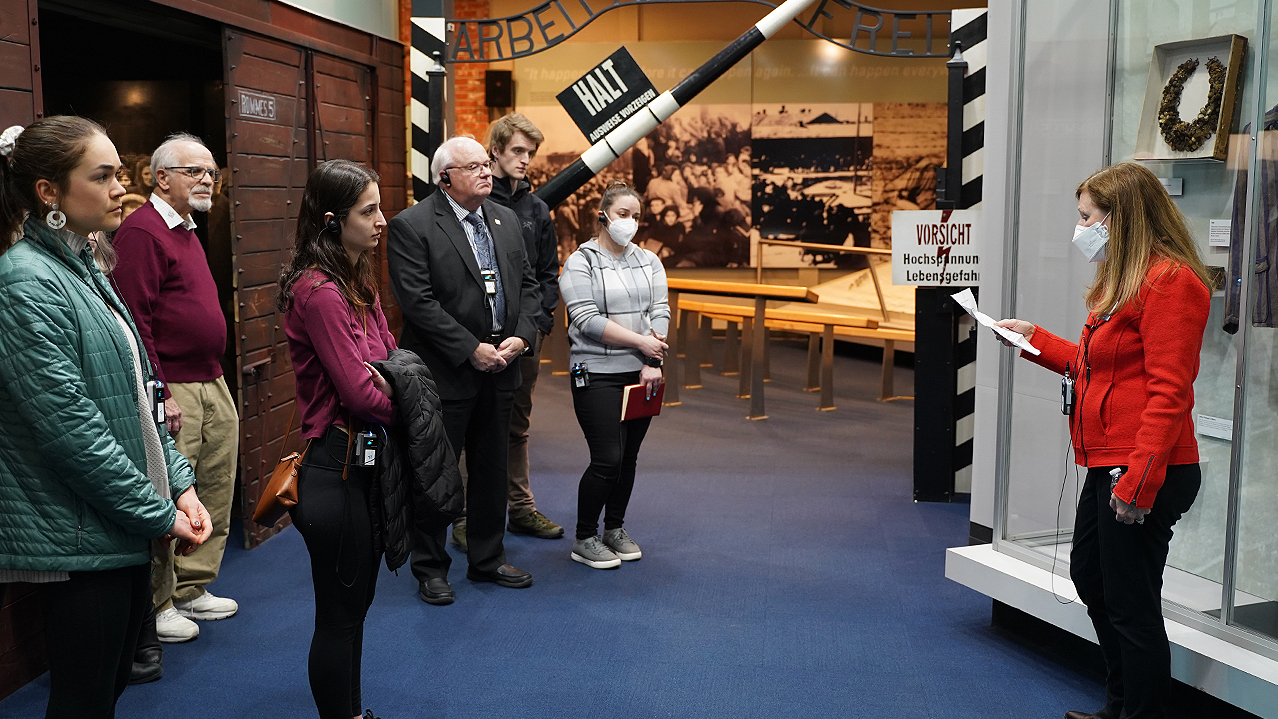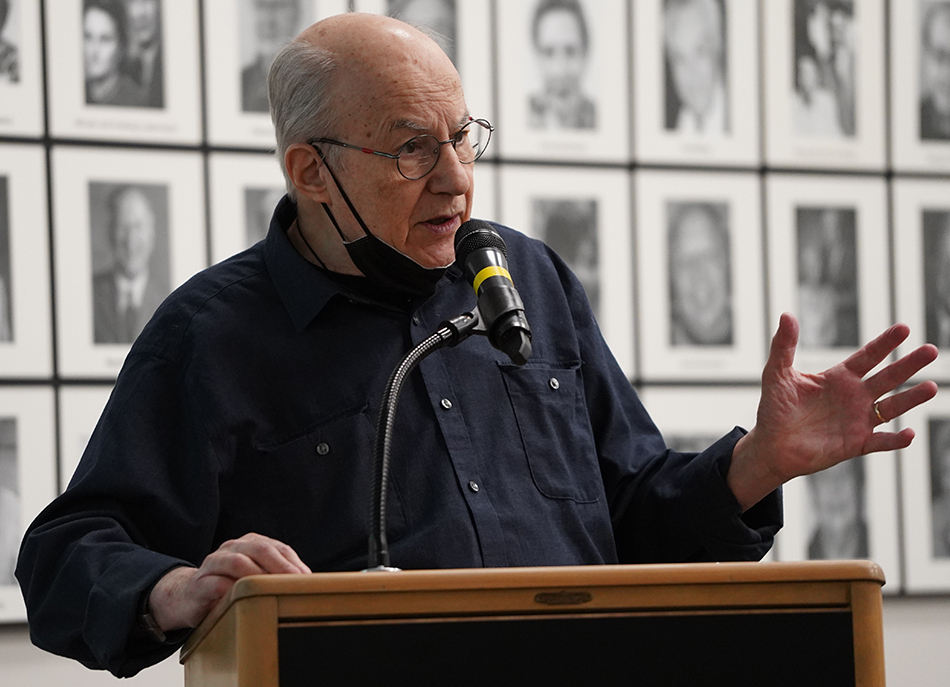
Nearly two dozen OUWB medical students traveling soon to Poland as part of the OUWB Study Trip to Auschwitz recently toured The Zekelman Holocaust Center in Farmington Hills.
The visit represented a significant step for the OUWB students and others who are preparing for the study trip set for June 13-20.
In addition to the students, others in the group included Duane Mezwa, M.D., Stephan Sharf Dean, OUWB, along with program co-directors — Jason Wasserman, Ph.D., associate professor, Department of Foundational Medical Studies, and Hedy Wald, Ph.D., clinical professor of Family Medicine at Alpert Medical School of Brown University, and faculty member at Harvard Medical School Global Pediatrics Leadership Program.
The purpose of the OUWB Study Trip to Auschwitz in June is to allow students to delve into the distinctive and tragic era in the history of medicine and critically reflect on its implications for one’s own personal and professional development within the medical profession.
But that can’t be done without first having a broad understanding of the Holocaust — one of the primary reasons for the visit to the local memorial center, said Wasserman.
“Much of our time in Auschwitz is going to be focused on the physician’s role, either being complicit in the Holocaust on the Nazi side or resisting on the side of prisoners,” he said.
“Part of the motivation for coming (to the Zekelman Holocaust Center) is to give everyone a broad education on the Holocaust and what led up to it.”
The other big reason for the visit was to simply make people more aware of the local memorial.
“I love the fact that OUWB is very community-oriented and I think bringing in a place like (the Holocaust memorial) grounds it in that way, too,” said Wald. “We can see there are resources in the community we can learn from and that’s important.”
‘Really leaves an impression’
According to its website, the Zekelman Holocaust Center dates to 1984, when it first opened as the Holocaust Memorial Center on the campus of the Jewish Community Center in West Bloomfield. It relocated to its current location in 2004. (The address is 28123 Orchard Lake Road — a 30-minute drive from Oakland University’s main campus.)
(Story continues below.)
The center is open to the public and the organization says annually it reaches more than 100,000 people through “our teacher trainings, virtual museum experiences, virtual programs, and in-person visits to the museum.”
The OUWB contingency participated in a 90-minute tour that touched on various aspects of Jewish culture and the Holocaust.
Adrea Benkoff, M.D., a retired ophthalmologist, led one of two OUWB groups. Benkoff has been a docent at the center since 2004 and says she has done tours previously with students from OU.
“I’m always happy to do anything that’s requested, but especially for (this group) because they are looking so closely at how everything is related to medical ethics,” she said.
Paoula Choobchian called it “emotional and informative.”
“Sometimes I just had to hold my tears back,” she said. “It was just so surprising to see all of the different situations that the prisoners had to bear…it’s just so sad.”
Concurrently, Choobchian said she is “happy to have this opportunity to open my eyes to the history” especially as she prepares to become a doctor.
Jonathan Grey, an OUWB student participating in the study trip, is from Michigan and said he has been to the memorial center previously with other school groups.
“But every time you come here, you learn new things or are reminded of different things,” he said.
The OUWB group also heard a Holocaust survivor speak.
 |
| Rene Lichtman, a Holocaust survivor, shared his experiences with a tour group from OUWB. |
Rene Lichtman, Ph.D., helped start the Hidden Children and Child Survivors of Michigan group as well as World Federation of Jewish Child Survivors of the Holocaust. His has been a painter, a political activist, a filmmaker, and worked for 20 years in Beaumont Health’s education department.
For the OUWB group, Lichtman recounted his experiences of being in-hiding during World War II — from being separated from his family members to eventually being reunited.
“It’s very important to talk about the Holocaust and make sure people know these things,” said Lichtman. He said it’s particularly important for future physicians to understand given their responsibilities as doctors.
Hearing directly from a survivor has a big impact, too, he said.
“It really leaves an impression,” he said. “These people will remember me for the rest of their lives…something will happen 30 or 40 years from now that will trigger a memory of me.”
‘A life-changing experience’
The OUWB Study Trip to Auschwitz was announced last September.
It is scheduled to consist of a seven-day trip to Poland, with guided tours of places such as Auschwitz-Birkenau, special lectures, and interactive workshops.
| More from OUWB |
A seven-week seminar will follow the trip, taken for credit as part of OUWB’s Medical Humanities and Clinical Bioethics (MHCB) 3 course, in which students will discuss and reflect upon the trip experience, the relevance of this history to contemporary medicine, and develop projects to disseminate what they learned at a symposium dinner as well as to other community groups at OUWB, OU, and beyond.
“No doubt it will be a life-changing experience for the group and will continue to help form the identities of who these students will become as new physicians,” said Mezwa.
Funding for the trip is from numerous donors, including the Bella Rozencweig Hirsch Endowment for Biomedical Ethics.
When first announced, program application was open to all first-year medical students in good academic standing. Applicants had to write three essays. The 20 students selected were notified in late February.
Since then, preparatory sessions — in addition to the memorial visit — have been ongoing and included history and background, readings, and group reflection.
Mezwa said such preparations will yield “maximum value” for those participating in the study trip, including himself. Before leaving for Poland, Mezwa said he also plans to visit the U.S. Holocaust Memorial Museum in Washington, D.C.
“These visits will help me better understand the atrocities that took place and further reflect on how there are similarities to what we see is happening in our world today,” he said.
For more information, contact Andrew Dietderich, marketing writer, OUWB, at [email protected].
To request an interview, visit the OUWB Communications & Marketing webpage.
NOTICE: Except where otherwise noted, all articles are published under a Creative Commons Attribution 3.0 license. You are free to copy, distribute, adapt, transmit, or make commercial use of this work as long as you attribute Oakland University William Beaumont School of Medicine as the original creator and include a link to this article.

